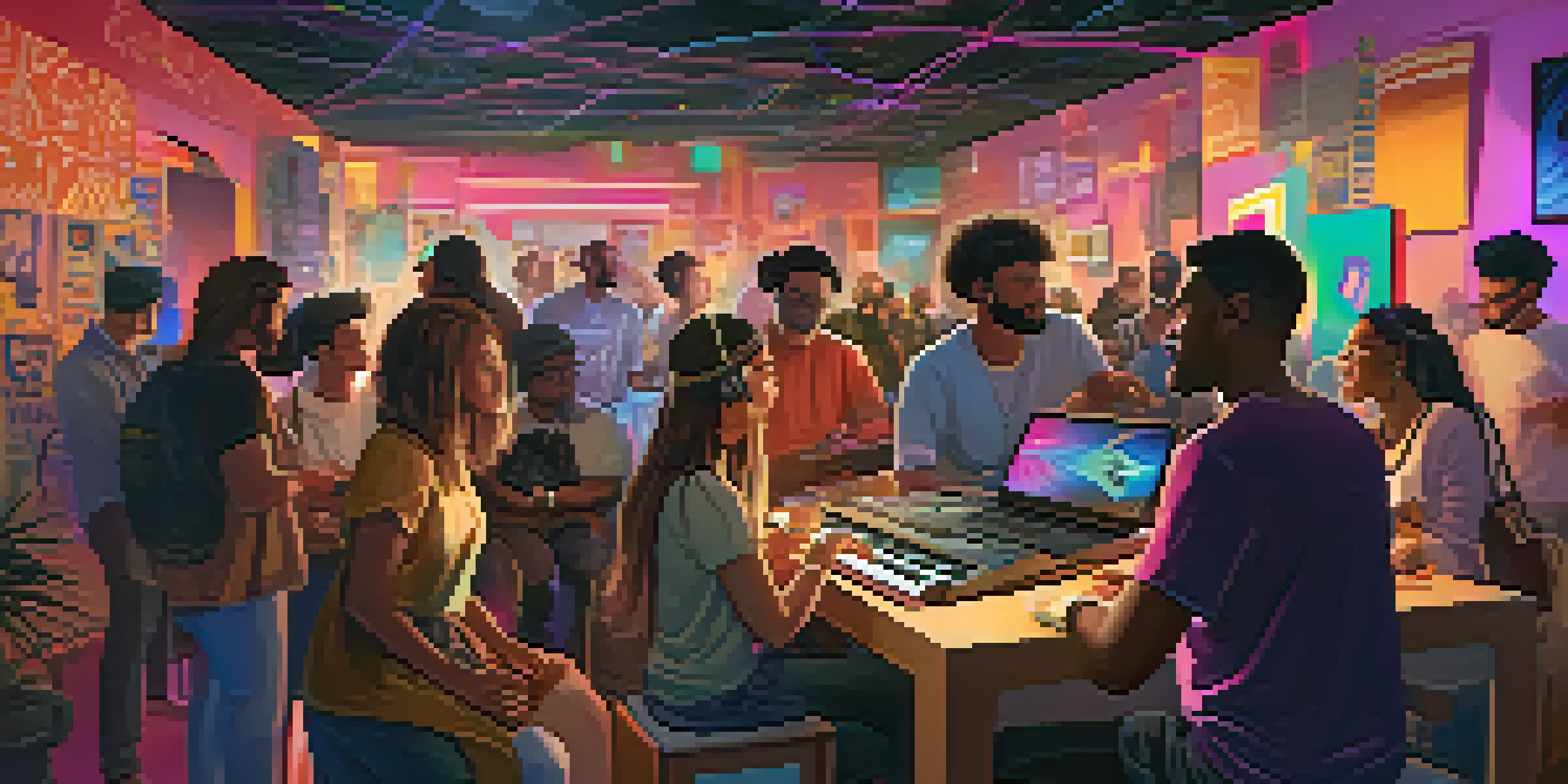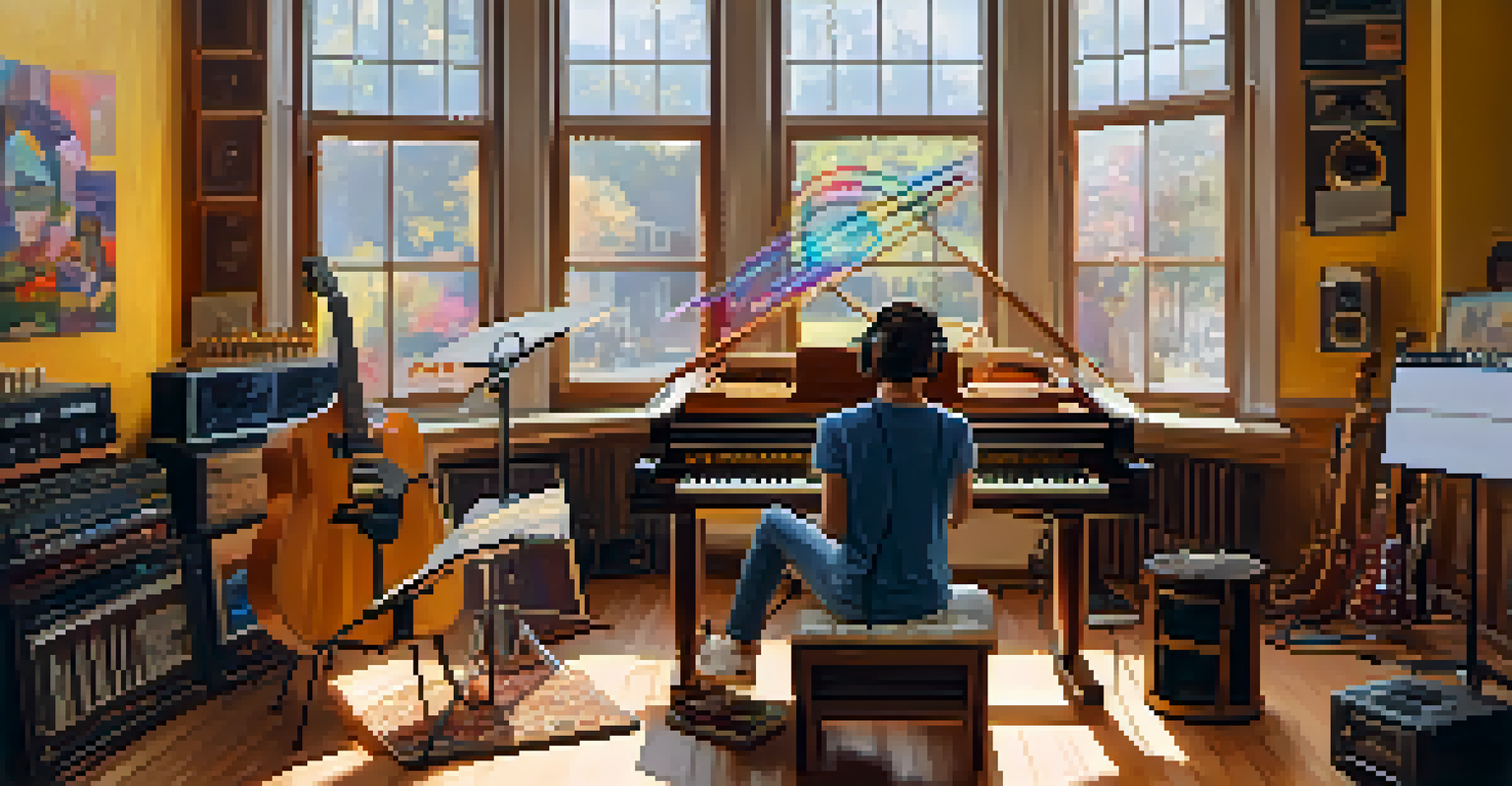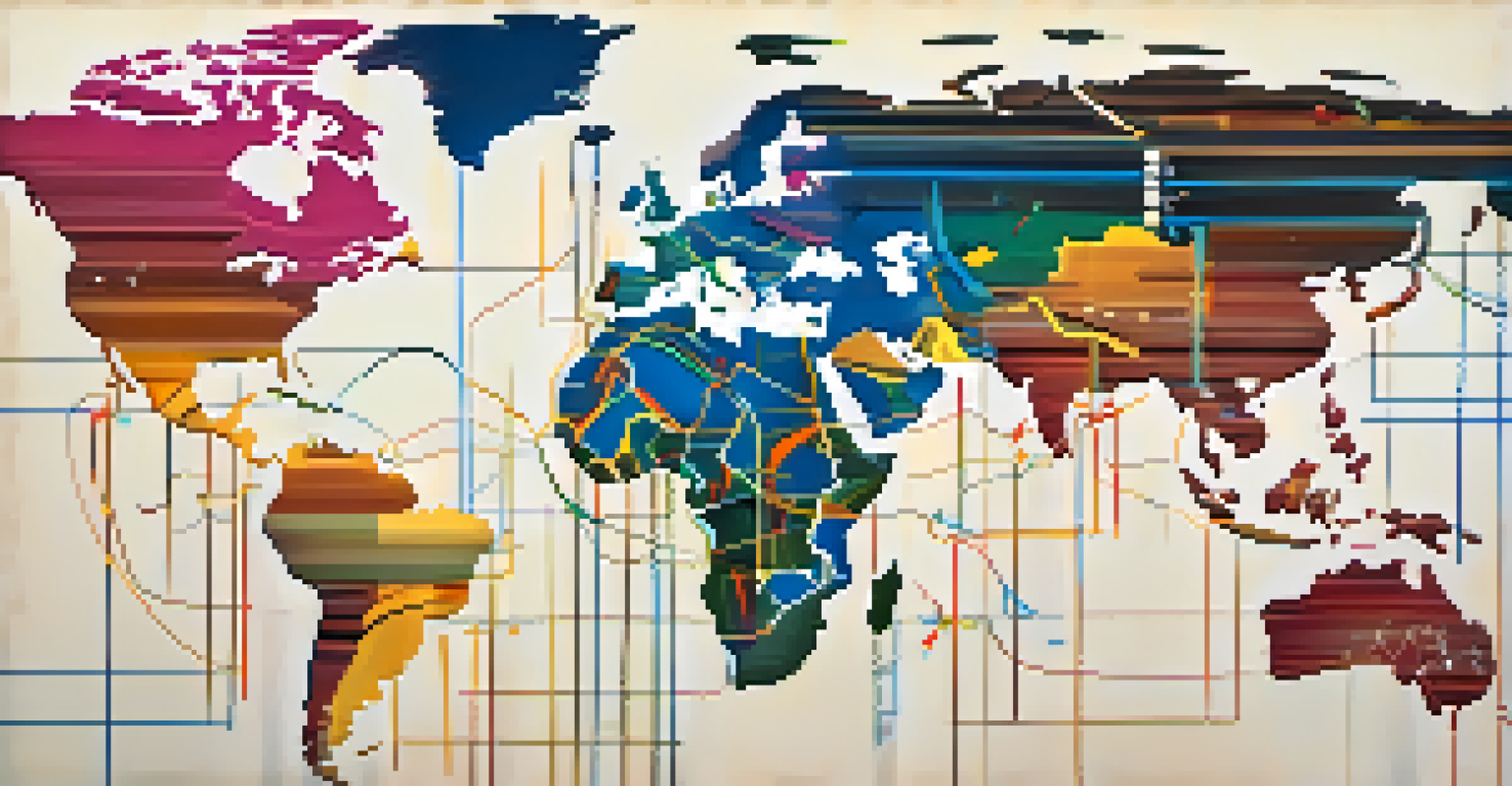The Role of Online Communities in Music Cultures Worldwide

The Rise of Digital Music Communities in the 21st Century
In the 21st century, digital technology has transformed how we connect with music. Online platforms like social media, streaming services, and forums have created spaces where fans can gather and share their passions. These digital communities often transcend geographical boundaries, allowing music lovers from diverse backgrounds to interact and collaborate.
Music is the shorthand of emotion.
Imagine a fan from Brazil sharing their favorite bossa nova tune with someone in Japan, who then introduces them to J-Pop. This cultural exchange enriches both communities, fostering appreciation for different music styles. As a result, online music communities are not just about fandom; they become vibrant cultural melting pots.
Furthermore, as these platforms grow, they nurture new genres and trends that might not have gained traction in traditional music markets. This democratization of music access encourages creativity and innovation, making the music scene more diverse than ever before.
Building Connections Through Shared Musical Interests
Online communities provide a unique platform for individuals to connect over shared musical interests. Fans can form friendships based on their love for specific genres, artists, or even niche subcultures. These connections often lead to meaningful relationships that extend beyond music, creating a sense of belonging among members.

Take, for example, the global K-Pop phenomenon, where fans form dedicated online communities to support their favorite groups. Through social media, they share fan art, create dance covers, and even organize charity events in the name of their idols. This level of engagement highlights how music can unite people from different walks of life.
Digital Music Communities Unite Fans
Online platforms connect music lovers across the globe, fostering cultural exchanges and diverse musical appreciation.
Moreover, these communities often serve as safe spaces for individuals to express themselves freely. Fans can share their thoughts, experiences, and emotions without fear of judgment, fostering an environment where creativity flourishes.
Empowering Artists Through Fan Engagement Online
Online communities have significantly empowered artists by providing direct access to their fanbase. Musicians can interact with fans through social media, sharing behind-the-scenes content, live streams, and personal stories. This level of engagement creates a deeper connection between artists and their supporters, fostering loyalty and enthusiasm.
The great thing about music is that it can change your mood, and it can change your mind.
For instance, independent artists can promote their music through platforms like Bandcamp or SoundCloud, reaching audiences they might not have accessed through traditional record labels. By engaging with fans directly, artists can also receive immediate feedback and adapt their work according to audience preferences.
This shift has not only changed the artist-fan dynamic but has also enabled musicians to cultivate their brands authentically. As artists share their journeys and challenges, fans feel more invested in their success, often becoming vocal advocates in their communities.
The Role of Online Communities in Music Discovery
One of the most significant contributions of online music communities is their role in music discovery. With countless genres and artists, it can be overwhelming to find new music. However, community members often share playlists, recommendations, and reviews, guiding each other toward hidden gems.
Imagine a Reddit thread dedicated to underground hip-hop, where users post links to fresh tracks and discuss their favorite up-and-coming artists. This collaborative effort not only helps listeners discover new music but also supports emerging artists who may not yet have mainstream recognition.
Artists Gain Power Through Engagement
Direct interaction with fans empowers musicians, allowing them to cultivate loyalty and adapt their work based on audience feedback.
As a result, online communities become essential for the survival of niche genres, allowing them to thrive despite minimal commercial attention. This elevation of diverse sounds enriches the global music landscape and encourages creativity among artists.
Cultural Exchange and the Globalization of Music
Online communities play a pivotal role in the globalization of music by facilitating cultural exchange. As fans share music from different regions, they help introduce diverse sounds and styles to new audiences. This exchange can lead to the blending of musical genres, creating innovative sounds that reflect a fusion of cultural influences.
For example, the rise of reggaeton can be attributed to the interaction between Latin and Caribbean musical traditions, amplified by online sharing. Fans from various countries contribute to this evolution by remixing tracks and incorporating their regional styles.
This globalization not only influences the music itself but also impacts the way people perceive and appreciate different cultures. Through online communities, fans gain a deeper understanding of the cultural context behind the music, fostering respect and appreciation for diversity.
The Impact of Online Communities on Music Education
Online communities have revolutionized music education, providing resources and support for aspiring musicians. Platforms like YouTube and TikTok offer tutorials and lessons, enabling individuals to learn instruments, music theory, or even production techniques at their own pace. This accessibility has democratized music education, making it available to a wider audience.
Additionally, communities often facilitate peer-to-peer learning, where experienced musicians share their knowledge with novices. For example, a guitarist might post a video explaining a complex chord progression, while others can ask questions and share their practice experiences. This collaborative approach fosters a sense of camaraderie among learners.
Communities Enhance Music Discovery
Online music communities play a vital role in discovering new artists and genres, enriching the global music landscape.
Moreover, online communities can also connect students with mentors and industry professionals, further enhancing their educational journey. This networking opens doors for opportunities that might not have been possible in traditional learning environments.
Challenges and Issues Facing Online Music Communities
Despite their many benefits, online music communities face challenges that can hinder their growth and inclusivity. Issues like gatekeeping, where established fans dismiss newcomers, can create a hostile environment for those trying to engage. This can discourage new members from participating, leading to a lack of diverse voices within the community.
Additionally, the prevalence of misinformation can be problematic. As fans share opinions and reviews, there’s a risk of spreading inaccurate information about artists or genres. This can lead to misunderstandings and reinforce stereotypes, ultimately harming the community's integrity.

To combat these issues, communities must prioritize inclusivity and open-mindedness. Encouraging respectful dialogue and fostering an environment where everyone feels welcome can help mitigate these challenges, ensuring that online music communities remain vibrant and supportive.
The Future of Online Communities in Music Culture
As technology continues to evolve, the future of online communities in music culture looks promising. With advancements in virtual reality and augmented reality, fans may soon experience live concerts and events in immersive ways, further enhancing their connection to the music they love. This could open new avenues for fan engagement and interaction.
Moreover, as more artists recognize the importance of online presence, we can expect an increase in collaboration between musicians and their communities. Artists may rely on fan input to shape their work, leading to a more participatory and inclusive creative process.
Ultimately, online communities will continue to play a crucial role in shaping the future of music culture worldwide. By fostering connections, promoting music discovery, and supporting artists, these communities will remain at the forefront of the ever-evolving music landscape.